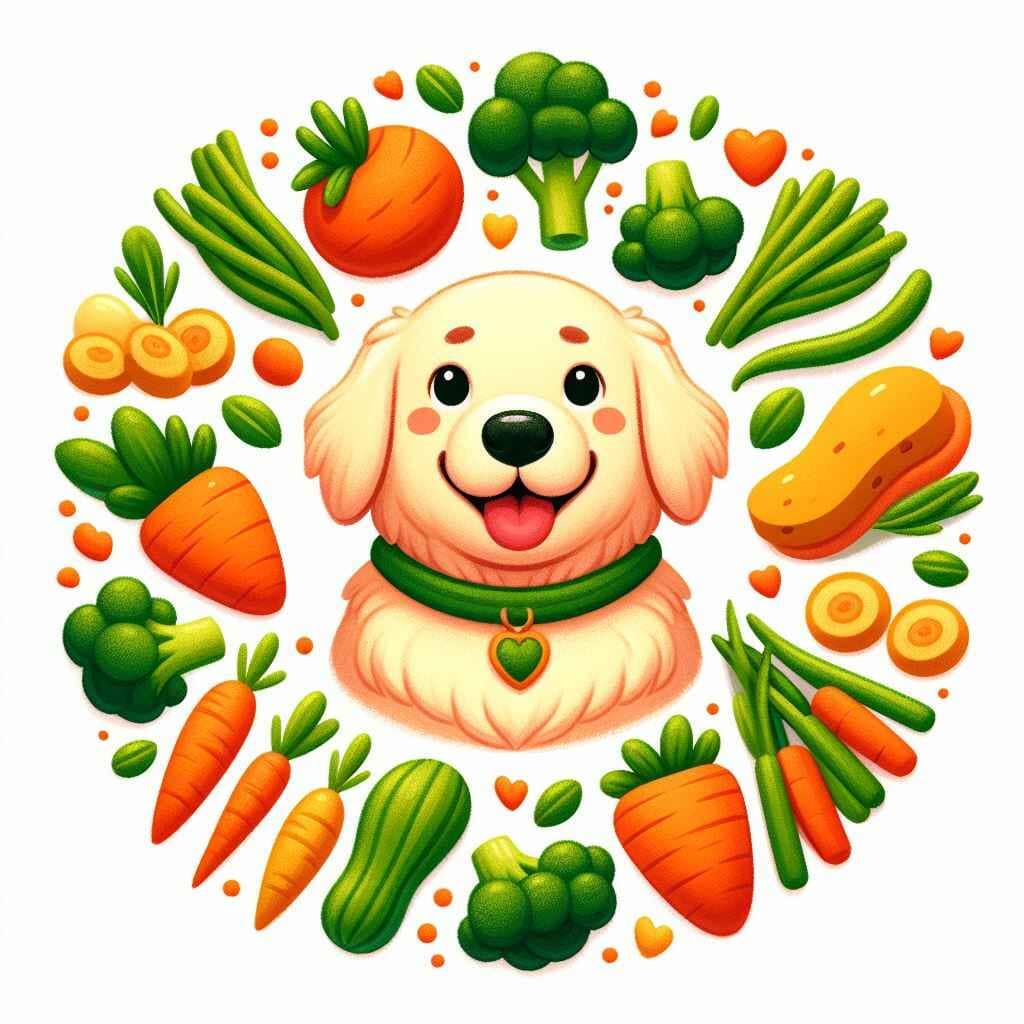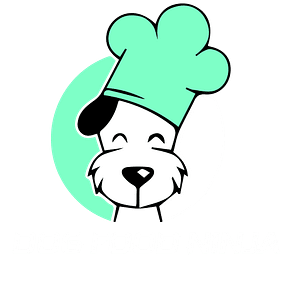The need for healthy substitutes is always rising in a country where pet welfare is of utmost importance. Now come vegetarian dog food recipes, a solution designed with responsibility.
This site, with terms like “vegetarian dog food” and “recipes,” reveals the fundamentals of feeding dogs without suffering. Learn how to satisfy your pet’s wants without compromising your moral principles with everything from crisp nibbles to flavorful stews.
Come along as we examine the relationship between nutrition and compassion. We will provide essential information for any pet owner looking for a more sustainable, healthy approach. Plant-based recipes can help us create a world where dogs are happy and healthy.

Table of Contents
Toggle1. Is A Vegetarian Diet OK for Dogs?
Dogs are omnivores that can get nutrients from plant-based and meat-based sources, so it is okay to feed them vegetarian food. But proper care and planning are essential so your dog can get all the nutrients, such as proteins, carbohydrates, fats, vitamins, and minerals.
Vegetarian food can be suitable and healthy for dogs, but you should customize it according to your dog’s age, breed, size, taste, and dietary preferences. You should have regular health monitoring of the dog so that you can detect or anticipate any changes in the dog’s health promptly.

2. What are the high-quality vegetarian protein sources for dogs?
You should always prioritize vegetarian protein sources when preparing dog food and include high-quality ingredients in the recipe. Although meat is an important protein source, many plant-based alternatives can meet protein requirements. Here are some of the healthiest vegetarian protein sources for dogs:
1: Legumes: Lentils, chickpeas, kidney beans, and other legumes are packed with protein and fiber. They provide essential amino acids. It can be easily incorporated into homemade dog food recipes, and you should cook them thoroughly before feeding them to your dog.
2: Quinoa: Quinoa is a nutrient-rich seed that’s a good source of protein. It is an excellent choice because it has every one of the nine amino acids dogs need. It also contains carbohydrates that make vegetarian food more nutritious.
3: Tofu: Tofu is rich in protein, made from soybeans, and can be a versatile option for your dog. Because tofu is high in protein and low in saturated fat, it can be a healthy alternative to meat-based protein. 4: Eggs: Although they are not vegetarian, they are an efficient source of protein for dogs, containing essential amino acids. They are rich in vitamins and minerals, including vitamin B12 and selenium.
5: Dairy Products: Dairy products can also be added to vegetarian dogs’ diets.[In moderation], dairy products include cottage cheese, yogurt, and cheese. They are packed with essential nutrients, calcium, and protein.
6: Nutritional Yeast: Deactivated yeast is a high-protein diet and contains B vitamins, which can help balance the amino acid profiles of other vegetarian ingredients.

3. An Overview of Vegetable Dog Food:
When choosing a vegetarian diet for your dog, make sure to select nutritious veggies.
If you want to provide dogs with the nutrients they require—such as taurine and L-carnitine—you must choose vegetarian components for dog food that satisfy their dietary requirements.
Vegetarian food is the best choice because some dogs have sensitivities to the protein found in meat.
Legumes (lentils, chickpeas, beans), soy products (tofu, tempeh), grains (quinoa, rice), dairy (cottage cheese, yogurt), and egg products are some of the main components of a vegetarian diet.
you can also prepare homemade vegan dog treats.
Before introducing a vegetarian diet to your dog, you should consider its special dietary needs and overall health.
4. Benefits of Dog Food That Is Vegetarian:

1. Handling Allergies:
Vegetarian food relief for some dogs with meat allergies and sensitivities, such as chicken, lamb, fish, etc. Many dog food formulas use specific ingredients like chickpeas, lentils, and peas that have low allergy reactions to sensitive dogs.
Vegetarian meals often use fewer ingredients. Because of this, you can identify ingredients to which your dog is allergic, eliminate them from the dog’s diet, and protect the dog from allergies.
Preparing dog food at home allows pet owners to avoid adding ingredients to their dog’s meal that they are allergic to and can tailor the food to their special taste preferences and dietary needs.
2: Environmental Sustainability:
Raising animals for food requires a lot of water, while plant-based production generally has lower water requirements, leading to water conservation in vegetable diets.
Plant-based dog food choices, which require fewer natural resources such as water, energy, and land, can save water and land for human food production by reducing the demand for meat production.
By choosing vegetarian dog food, you can comply with regulations on ethical consumption and animal welfare and support more humane and sustainable food production practices.
3: Ethical Considerations:
Choosing plant-based farming can reduce animal suffering. Factory farming practices often raise concerns about animal welfare, and choosing such food reduces one’s contribution to the demand for meat and its associated ethical issues.
Some pet owners make ethical decisions by choosing vegetarian dog food based on their values. By doing this, you won’t compromise your values and can give your dog a happy life and nutrient-rich food with vegetarian food.
However, vegetarian dog food is effective for individual health and other environmental benefits, animal welfare, and ethical values.
5. homemade vegetarian dog food recipes that are vet-approved:
Pet owners may be concerned about providing their dogs with handmade vegetarian meals since they don’t want to risk nutritional deficiencies or weaknesses. Additional problems include finding time for preparation and sourcing ingredients. Homemade vegetarian dog food can provide a healthy and satisfying diet that is in line with ethical principles and enhances the general well-being of beloved pets with the right knowledge and attention to detail.
6. Healthy And Easy-to-Make Vegetarian Dog Food Recipe:
Now, I’m sharing with you a recipe for only vegetarian dog food. This recipe has 422 calories per serving, which might be a sufficient calorie amount for your dog. Now I’m telling you how to make I, and. this recipe is vegetarian, healthy, and easy to make. It’s only got four ingredients.
- 1: Ingredients;
- ⅔ of a cup of uncooked Keno
- 1 cup of Peas
- One large Sweet Potato
- 2 Bananas

2: Instructions;
You have to boil Keno in ⅓ cups of water, which yields 2 cups of cooked Keno.
Boil 1 cup of peas in water.
You can boil sweet potatoes or bake them in the oven at 400 degrees for about an hour. When cooked, cut them into fine dice.
Cut the bananas into small slices.
Now take a bowl, add all the ingredients in it one by one, and mix it well.
Finally, this mixture is ready to be served to your dog. Your dog will love this meal, and you will see how quickly he finishes his whole bowl of food.
You can save leftover food in an airtight container in a refrigerator for 3 to 5 days or in a freezer for about a month.
The great thing about homemade food is that you can cater it to your dog’s needs. The recipe that I have mentioned uses ingredients that have many nutritional benefits. Sweet potatoes contain high dietary fiber and vitamins C, A, and B6. It supports a healthy dog’s skin and coat. Eggs are rich in nutrients. It contains protein, vitamins B2 and B12, and linoleic acid, which lead to a dog’s healthy skin and coat. Bananas are a great source of vitamins B6 and C, potassium, magnesium, and fiber.
Peas are a source of vitamins A, K, and B, which support a dog’s bone health, immune system function, vision, and overall well-being.
Conclusion:
Choosing vegetarian dog food recipes can have many benefits, including addressing health concerns, aligning with ethical beliefs, and promoting environmental benefits. By choosing nutritious ingredients and tailoring meals to your dog’s nutritional needs and health, you can provide them with delicious homemade meals.
A vegetarian dog food recipe tailored to your dog’s needs, health, and size can be a nutritious and satisfying option. In this article, I have given you the recipe for making vegetarian food for dogs. I hope your dog will enjoy it, and you will be satisfied that you are feeding your dog a healthy and well-balanced meal.
FAQ’s:
Is it Safe to Feed My Dog a Vegetarian Diet?
Dogs are omnivores and can thrive on vegetarian diets with proper planning. Ensure your dog receives all essential nutrients like proteins, carbohydrates, fats, vitamins, and minerals.
What Are the Best Vegetarian Protein Sources for Dogs?
Optimal vegetarian protein sources for dogs include legumes (such as lentils and chickpeas), quinoa, tofu, eggs, dairy products (in moderation), and nutritional yeast. These ingredients provide essential amino acids and nutrients for your dog’s health.
How long can I store homemade vegetarian dog food?
Homemade vegetarian dog food can be stored in an airtight container in the refrigerator for 3 to 5 days or in the freezer for about a month. Always follow proper food safety guidelines to maintain freshness and quality.
What Are the Benefits of Vegetarian Dog Food?
Vegetarian dog food can offer benefits such as managing allergies, promoting environmental sustainability, and aligning with ethical considerations. Homemade vegetarian meals allow pet owners to control ingredients and tailor diets to their dogs’ preferences.

